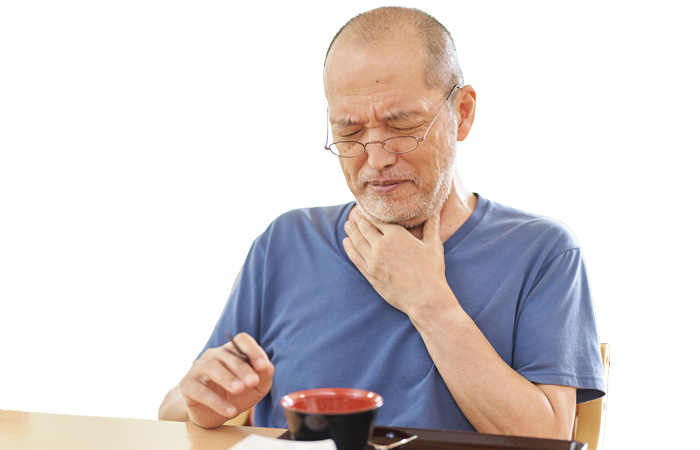In Conditions
Follow this topic
Bookmark
Record learning outcomes
A three-to-five-centimetre ring of muscle, the lower oesophageal sphincter, connects the stomach and food pipe (oesophagus). The sphincter normally prevents stomach acid from flowing along the oesophagus towards the throat – so-called acid reflux, of which heartburn is a symptom.
Sometimes, however, the acid passes from the stomach into the oesophagus causing indigestion.
For most of us, indigestion caused by, for example, an especially hot curry, is easily treated. The pharmacy team can offer lifestyle advice and a plethora of effective over-the-counter (OTC) indigestion remedies.
But don’t underestimate acid reflux. Numerous drugs can cause indigestion and severe, frequent acid reflux increases the risk of tooth decay, asthma exacerbations and even oesophageal cancer. So, how can you help manage this burning issue?
Symptoms and triggers
Often, acid reflux does not cause symptoms. Guts UK estimates that one in every four adults in the UK has heartburn: a burning sensation in the middle of the chest.
In addition to heartburn, patients with acid reflux may experience other symptoms of indigestion including:
- An unpleasant sour taste
- Regurgitating food
- Recurrent cough or hiccups
- A hoarse voice
- Bad breath
- Feeling full and/or bloating
- Burping and/or farting
- Nausea.
Patients often find that the symptoms are worse after eating and when they lie down or bend over.
The terms ‘heartburn’, ‘indigestion’, ‘dyspepsia’ and ‘gastro-oesophageal reflux disease’ (GORD) are often used interchangeably. However, indigestion can mean just an occasional episode after, for example, eating spicy food.
Heartburn is one symptom of indigestion. Doctors may diagnose ‘dyspepsia’ when the patient experiences pain or discomfort in the upper abdomen caused by acid reflux for at least four weeks.
GORD refers to frequent and more severe attacks of acid reflux. The stomach acid may reflux into the mouth, throat and lungs.
GORD can cause or worsen, for example, tooth decay, laryngitis, cough, sinusitis and asthma. As we will see later, GORD may injure the food pipe and resultingly increase the likelihood of oesophageal cancer.
A GP can refer patients for a gastroscopy to try to discover the cause of the dyspepsia. In most cases of dyspepsia, however, there is no obvious cause and an endoscopy (a thin tube with a camera that goes down the oesophagus and into the stomach) is normal. Doctors call this ‘functional dyspepsia’.
Nevertheless, many lifestyle factors can trigger acid reflux in some people including certain foods and drinks, such as coffee, tea, tomatoes, cola, alcohol, chocolate and fatty or spicy foods.
Heartburn can also be a symptom of another medical condition, including being overweight, smoking, pregnancy, stress and anxiety, hiatus hernia (part of the stomach enters the chest) and stomach ulcers.
Always refer people who do not find that lifestyle changes and OTC indigestion remedies resolve their symptoms of acid reflux to their GP.
Certain medicines, including aspirin, ibuprofen and other non-steroidal anti-inflammatory drugs, irritate the stomach, which can cause indigestion and dyspepsia.
Other drugs that may cause dyspepsia include alpha-blockers, antimuscarinics, benzodiazepines, beta-blockers, bisphosphonates, calcium-channel blockers, corticosteroids, nitrates, theophyllines and tricyclic antidepressants.
If you think that a medicine may contribute to heartburn or dyspepsia, you could suggest the pharmacist performs a Medicines Use Review to see if the treatment is still needed, if there are alternatives and that the patient takes the lowest effective dose.
“Simple lifestyle changes ease or stop acid reflux, such as eating smaller meals at regular intervals”
Lifestyle change
Often simple lifestyle changes ease or stop acid reflux, such as eating smaller meals at regular intervals. Patients should avoid foods or drinks that trigger symptoms, and those with acid reflux should not eat within three or four hours of bedtime.
Drinking too much alcohol can cause indigestion and dyspepsia. On the other hand, losing weight, if the person is overweight, quitting smoking and finding ways to relax often alleviates acid reflux.
You could also suggest raising the head of the patient’s bed by 10–20cm, using wood, bricks or books, so that the chest and head are above the waist.
This helps prevent reflux while asleep: the acid has to flow ‘up-hill’. However, using additional pillows to raise the head can increase pressure on the stomach and, indeed, can worsen indigestion. Some people find that not wearing clothes that are tight around the waist helps.
From the counter
Pharmacies can provide several products that alleviate acid reflux including antacids or alginates. Antacids (such as calcium carbonate, magnesium carbonate or sodium bicarbonate) neutralise the acid.
Alginates (such as alginic acid) are extracted from the cell wall of brown algae (seaweed), especially large kelps and wracks. (The term ‘alginate’ reflects their origins in algae.) Alginates form a gel raft that floats on the stomach’s contents. This forms a barrier that stops acid from refluxing into the oesophagus.
OTC antacids or alginates are available in various formulations, including liquids and tablets. Some products contain antacids and either alginates or simethicone, which counters flatulence. So, you should be able to find a product that suits the patient.
Advise patients to take antacids or alginates with food or soon after eating. Patients are most likely to get acid reflux after a meal and antacids or alginates may work for longer if taken with food.
As mentioned, lying down may trigger acid reflux, so many people finding taking antacids or alginates just before bedtime is most effective. Remind patients not to take any other medicine within two to four hours of using antacids. Antiacids can affect how well some drugs work if taken too closely together.
If you are unsure, ask the pharmacist, and remember that antacids or alginates are not cures. People who take antacids or alginates regularly for a long time should see their GP.
Proton pump inhibitors and H2 receptor antagonists reduce acid production by the stomach. Certain proton pump inhibitors (such as omeprazole and esomeprazole) and some H2 receptor antagonists (e.g. famotidine and cimetidine) are available over the counter.
Make sure patients appreciate that they should not take OTC proton pump inhibitors and H2 receptor antagonists for more than two weeks. Advise patients to see their GP if the drugs do not work or the symptoms of acid reflux return after completing their course of treatment.
Doctors can check the diagnosis and prescribe additional drugs and higher doses than those available OTC. Occasionally, surgeons operate to stop acid reflux.
Problems in pregnancy
Indigestion is common during pregnancy, especially from week 27. Women with indigestion before pregnancy or who have been pregnant before are particularly prone to indigestion during pregnancy.
Hormonal changes and the baby pressing against the stomach can cause indigestion during pregnancy. In addition, the sphincter between the stomach and oesophagus can relax during pregnancy, allowing acid reflux. The lifestyle advice for pregnant women is similar to other adults.
However, you must always check that any indigestion remedy is suitable for pregnant women. If in doubt, check with the pharmacist. If these changes do not help, advise the woman to speak to a GP or midwife.
It’s important to remind pregnant women to not use antacids within two hours of taking folic acid or iron supplements. Antacids can reduce absorption of these vital nutrients.

Check with the pharmacist before recommending antacids to pregnant customers.
“One in every four adults in the UK has heartburn”
Warning signs for cancer
The pharmacy team should be aware of the red flags that may indicate a person with indigestion has a more serious disease. Remarkably, for example, a bacterium called Helicobacter pylori can survive in the stomach, despite the acid, by ‘hiding’ in the mucus.
Specialists can test for H. pylori, which can cause heartburn and stomach ulcers, and increase the risk of stomach cancer. A combination of antibiotics and PPIs eradicates H. pylori.
GORD is a well-established cause of oesophageal cancer. Stomach acid can dissolve certain metals. So, not surprisingly, repeated acid reflux can injure and inflame the area between the stomach and oesophagus.
Occasionally, the cells become abnormal: a condition called Barrett’s oesophagus. In turn, Barrett’s oesophagus increases the risk of oesophageal cancer.
So, what are the risks? According to Guts UK, about one in 10 people with GORD develop Barrett’s oesophagus.
Those people with longer duration of, and more frequent, GORD attacks are most likely to develop Barrett’s oesophagus. You can, however, reassure GORD patients that they are very unlikely to develop oesophageal cancer.
Oesophageal cancer is not particularly common, accounting for about one in 50 new malignancies in the UK.
Cancer UK predicts that in the UK, among people born in 1961, one in 120 females and one in 54 males will be diagnosed with oesophageal cancer.
Most patients will be elderly people. Oesophageal cancer is most common among people aged 75 years and older, who account for 41 per cent of these malignancies.
Against this background, a 2013 review published in the Journal of the American Medical Association found that about one Barrett’s oesophagus patient in every 400 who show inflamed but not markedly abnormal cells (no dysplasia) develops oesophageal cancer a year.
“GORD is a well-established cause of oesophageal cancer”
But, one in 17 Barrett’s oesophagus patients with very abnormal cells (high-grade dysplasia) develops oesophageal cancer annually.
Further reassurance emerged in a study published in 2023 in the British Medical Journal that followed 258,811 people from Sweden, Denmark and Finland with GORD but no gastroscopic evidence of oesophagitis (inflammation of the ‘mucus membrane’ – the cells lining the oesophagus) for up to 31 years.
There was no increased risk of oesophageal cancer in these patients compared with controls from the general population matched for age, sex and period.
The researchers also followed 200,745 people with GORD and oesophagitis for up to 31 years. These patients were about twice (136 per cent increase) as likely to develop oesophageal cancer as controls.
“This is a gratifying result since reflux disease is a very common condition and most patients are found to have a completely normal mucus membrane on gastroscopic examination,” says Dag Holmberg, from the Department of Molecular Medicine and Surgery, Karolinska Institute, and one of the study’s authors.
“Our study suggests that repeated gastroscopies are probably unnecessary for people with reflux disease who have a normal oesophageal mucosa. These findings should be reassuring for this large patient group.”
The team intend to examine what factors other than oesophagitis may promote tumour growth in people with GORD. Previous studies link alcohol, smoking or using other tobacco products, and being overweight or obese, for example, with an increased risk of developing oesophageal cancer.
In the meantime, you can take vital steps to reassure patients. “I would advise the pharmacy team when faced with a patient worried about cancer risk associated with GORD that the risk is minimal and that the risk is even lower if they have had a normal endoscopy,” says Jesper Lagergren, professor of surgery at the Department of Molecular Medicine and Surgery, Karolinska Institute, and author on the study.
The pharmacy team can manage most cases of indigestion with lifestyle advice and OTC remedies, but should still be aware of instances that require further investigation, especially as the Christmas season approaches.
Watch out for people with more severe, frequent attacks and the red flags, and refer when appropriate. It is also important to implore customers who regularly take medicine for heartburn to try instill some lifestyle changes, too.
Spotting red flags
Patients who experience heartburn and/or other symptoms of indigestion on most days and in whom lifestyle changes and pharmacy medicines do not help their symptoms should see their GP.
Similarly, advise people experiencing difficulty swallowing, frequently being sick or losing weight for no reason to see their GP. Other red flags include severe pain, iron deficiency anaemia, feeling as if there is a lump in the stomach, swollen glands in the neck, and bloody vomit or faeces.
Advise patients who feel the symptoms are getting worse, to contact a GP, call 111 or visit 111.nhs.uk.
Because of the cancer risk, NICE recommends urgent endoscopy for patients with dysphagia and significant acute gastrointestinal bleeding, and for people aged 55 years and older with unexplained weight loss and upper abdominal pain, reflux or dyspepsia.

Anyone experiencing difficulty swallowing should be referred to their GP.
Further information
- BNF: Dyspepsia: bnf.nice.org.uk/treatment-summaries/dyspepsia/
- Guts UK: gutscharity.org.uk
- National Childbirth Trust: How to cope with common discomforts during pregnancy: nct.org.uk/information/pregnancy/body-pregnancy/how-cope-common-discomforts-during-pregnancy

